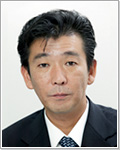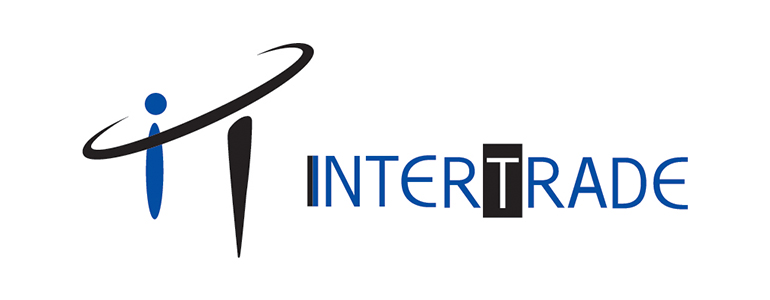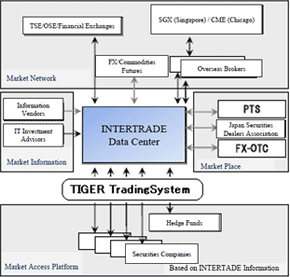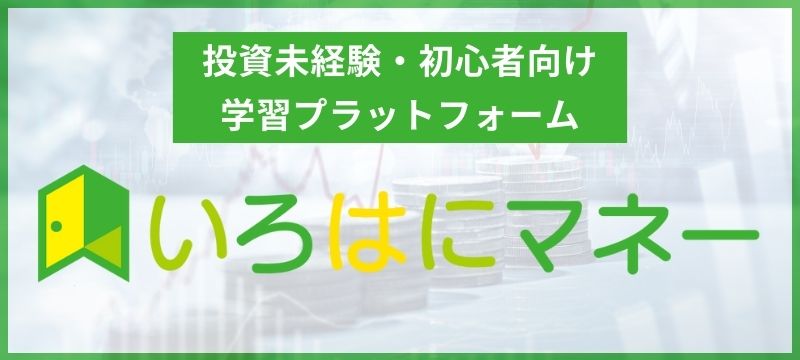| INTERTRADE Co., Ltd. (3747) |
|
||||||||
Company |
INTERTRADE Co., Ltd. |
||
Code No. |
3747 |
||
Exchange |
Mothers Section, TSE |
||
Industry |
Information, Communications |
||
President |
Takahiro Ozaki |
||
HQ Address |
Kayabacho First Building, 1-17-21, Shinkawa, Chuo-ku, Tokyo, |
||
Year-end |
September |
||
URL |
|||
* Share price as of closing on November 18, 2011. Number of shares outstanding as of most recent quarter end, excluding treasury shares.
|
||||||||||||||||||||||||
|
|
* Estimates are those of the Company.
|
|
| Key Points |
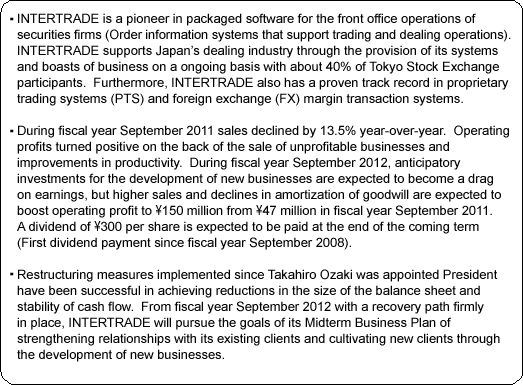 |
| Company Overview |
|
<Corporate History>
INTERTRADE was established in January 1999 by the first President of INTERTRADE Kazuya Nishimoto, the current President Takahiro Ozaki and the former President Yukio Araki, all of whom worked at Nihon Kangyo Kakumaru Securities (Currently Mizuho Investors Securities Co., Ltd.). The three founding members, Kazuya Nishimoto, Takahiro Ozaki and Yukio Araki, leveraged experiences gained at Nihon Kangyou Kakumaru Securities working in systems, dealing, and sales, respectively, to provide consulting services and later expanded into the development of packaged software for dealing and trading operations. In September 2000, INTERTRADE began sales of "TradeOffice-SX" packaged software system for securities companies' dealing operations and in February 2002 launched "TradeOffice-SX Trading Version." INTERTRADE is a pioneer in the realm of packaged software dealing systems, and has benefitted from rapid earnings growth due to the popularity of its packaged software, which is sought after by various securities companies seeking to supplement the deterioration in their own earnings resulting from the deregulation of commissions accompanying the elimination of the trading floor operations and floor traders at the Tokyo Stock Exchange (TSE) in end April 1999. In addition, INTERTRADE has achieved strong results in the realm of back office systems for securities companies (Client information and account reserves management systems) and middle office systems (Risk management systems to measure risks of contract positions) as securities companies have grown to increasingly favor total solutions. In March 2003, the Company leveraged network technologies to widen its service menu and began providing an "information distribution service" (Distribution of market information for the TSE and other major exchanges). And in September 2004 INTERTRADE listed on the Mothers Section of the TSE. Thereafter INTERTRADE fortified its packaged software lineup with the sales launch of the proprietary trading system "ITMonster" in January 2005, and the release of a foreign exchange margin trading system in August 2007. With the objectives of fortifying its core businesses and cultivating new businesses, the Company began undertaking M&A activities with the acquisition of Arts Asset Management Co, Ltd. (Currently INTERTRADE Asset Management Co, Ltd.) in April 2006 and The Arts Securities Co., Ltd. in June 2006 as consolidated subsidiaries. In April 2007, INTERTRADE acquired Bradea Co. Ltd., one of its competitors and the creator of a high performance and highly reliable trading system called "TIGER," as a consolidated subsidiary (Merged into INTERTRADE in October 2008) to expand its share of the front office systems market. In August of 2007, a next generation securities dealing and trading system fusing the strengths of both INTERTRADE and Bradea and called "TIGER Trading System" was released. In addition, "TIGER" achieves the highest levels of performance within the industry due to its unique architecture called "Bradea Distributed Architecture," which is based on bountiful experiences developing and operating systems used by front offices of foreign brokerage houses. In addition to Deutsche Securities Inc., this system has been implemented and is operating at the offices of other participants in the Tokyo Stock Exchange. <Business Segments and Representative Products and Services>
(1) Business Segments
INTERTRADE' s business can be divided into the two segments of securities solutions business, which accounted for 98% of fiscal year September 2011 sales (Before consolidated adjustments), and asset management business. Of the securities solutions, 83% of sales are derived from packaged software systems for dealing and trading operations (Division 1), with the remaining sales derived from proprietary trading systems and foreign exchange margin trading systems (Division 2: Clients other than the proprietary trading divisions of securities companies). Furthermore, sales of the securities solutions business can be divided into the implementation of new systems, including one-off sales of "package sales," "hardware sales," and "consigned development sales," in addition to repeat business of maintenance fees and asset management related consulting services for which monthly fees are received. This split between sales derived from implementation and repeat businesses contributes to stability in INTERTRADE' s earnings, with repeat business accounting for 79% of total consolidated sales.
  <Industry Trends and Competition>
(1) Business Partners
While some securities companies develop and operate their own unique dealing systems, many choose to implement packaged type systems and customize them as necessary. Currently INTERTRADE provides services to 40 companies (30 of these are for dealing systems) that spans a wide range of companies including foreign securities companies, second tier securities companies, medium and small sized securities companies.
(2) Competitors
Among INTERTRADE' s competitors are Fidessa group plc. of the United Kingdom (Sales of less than ¥30 billion in FY12/10, calculated at an exchange rate of ¥112 per Pound), which provides trading system and other solutions to financial institutions and maintains business with 80% to 90% of the world' s major securities and asset management companies. Another competitor is FUJISOFT INCORPORATED' s affiliate Tosho Computer Systems Co., Ltd. (Sales of ¥4.8 billion in FY3/09), which provides the "COSMO" securities comprehensive administrative management system, "FTnet Service" fund transfer data exchange infrastructure service, and "GIGA DRMS" next generation comprehensive dealing system.
(3) Customer Trends
The investments that INTERTRADE have conducted for the development of systems which can respond to the next generation transaction system of the Tokyo Stock Exchange called "arrowhead" (Launched on January 4, 2010) have been completed. Therefore investments are now being restrained in light of the continued difficult operating environment due to stagnant trading value of the equity markets.
(4) Business Environment
Competition is intensifying due to a decline in the number of projects, and pricing on orders is also weakening. In addition, the implementation of "arrowhead" with its high speed and large volume capabilities has reduced the advantage of securities companies' dealing systems, and forced many securities companies to retreat from the dealing business due to deterioration in profitability on this business.
<Future Developments>
(1) Path Travelled to This Point, Creation of Midterm Business Plan
After record profits were achieved during fiscal year September 2006 on the back of the large proprietary trading system "ITMonster" (Launched in January 2005), profitability has declined due to the dispersal of resources resulting from INTERTRADE' s advance into the realm of securities through its M&A activities. Consequently INTERTRADE realized net losses from fiscal year September 2007 to September 2010. From fiscal year September 2009, the Company implemented measures to restore earnings, including Group wide restructuring and the elimination of risk assets. During the three years leading up to fiscal year September 2011, total assets were reduced by 57% to ¥3.57 billion from ¥8.41 billion. Also in fiscal year September 2011, INTERTRADE sold its middle office systems and securities company back office systems businesses, where profitability is difficult to achieve, and recorded a net profit for the first time in five terms.From fiscal year September 2012 forward, INTERTRADE has created a Midterm Business Plan detailing specific measures to be implemented and will promote various strategies to restore growth. Some key points of the Midterm Business Plan are the fortification of "front office system business" and "market place business," and cultivation of "new businesses." In addition, fortification of the main product "TIGER Trading System" will be implemented as a means of strengthening the Company' s foundation for the "front office system business," and "market place business," including foreign exchange margin online trading systems and proprietary trading systems where the potential for large gains in market share exist. Furthermore, efforts to develop the asset management and businesses outside of the realm of finance will be undertaken as part of INTERTRADE' s efforts to cultivate "new businesses" and create an earnings model that is more insulated from the volatility in system investments of the securities industry. 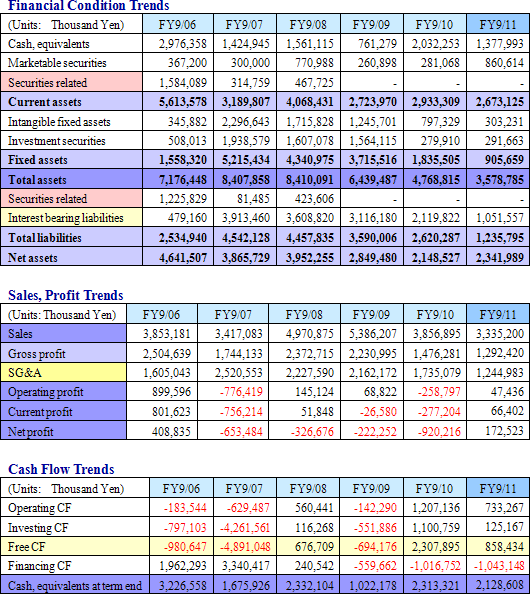 (2) Midterm Business Plan
Business Plan for the Coming Three Years
With regards to the main business area of "front office systems," INTERTRADE will seek to maximize its capital generation capability while remaining conscious of profitability. At the same time, the Company will allocate human resources to conduct aggressive marketing efforts to capture orders for "market place business" with high growth potential and "asset management business" for which the market is large. In addition, INTERTRADE will cultivate new businesses in fields outside of the finance industry (Research for several projects are already being conducted.).
Development Plans for Various Businesses
INTERTRADE boasts of a high share of the front office systems realm. And while there is a relatively steady amount of demand, the potential for growth in this realm is low because of INTERTRADE' s already high share. In addition, the trend of securities companies to retreat from the dealing business due to deterioration in profitability on trading (Contributing to a decline in clients), and difficult market conditions are also continuing. As a result, the following four measures will be implemented to put INTERTRADE back on a path of stable growth.
Front Office Systems Business ・ Promote Market Integrating Open Platforms (MIOP) Initiative to increase transaction with main customers (Note)
・ Leverage the proprietary fund management expertise of the consolidated subsidiary TRADEX Co., Ltd. to enter the upstream processes of asset management consulting
・ Develop hedge funds and other new clients
・ Fortify sales of exchange terminals
INTERTRADE' s Share of TSE Market Participants, 101 companies
 (Note) Market Integrating Open Platforms (MIOP)
Market Integrating Open Platforms (MIOP) refers to an adaptation of the "TIGER Trading System" that enables the transaction of "equities," "interest rates," "foreign exchange," "commodities," and other various financial instruments to be realized as a strategy to increase sales each client. Specifically, the "TIGER Trading System" has been equipped with "global connectivity environment," "high value added information," and "automated order" capabilities to enable customers to use the system to create new revenue streams and allow for highly accurate investment decisions and universal support to be conducted. INTERTRADE has already established a high volume network structure (All in-house networks have been created with GIGA-base capability data center and transmission lines) with the capability to distribute large volumes of information. With over 40 customers currently being serviced, this structure has reduced the burden upon each client (This structure also makes it expensive for customers to switch to other systems).
Market Place Business
The market for proprietary trading including foreign exchange margin trading and off exchange transactions is expanding, and the potential for increases in market share is high, unlike in the front office business. Furthermore business opportunities are expanding along with the deregulation of commodities futures transactions. An indication of the strength of INTERTRADE in foreign exchange margin trading systems is the fact that they already have business with several major customers. Another indication of the strength of INTERTRADE is the fact that it is the only system integrator with packaged software for proprietary trading within Japan. A characteristic of the market place business is the availability of a large number of high priced projects. Therefore INTERTRADE will leverage the above mentioned features to expand this business and establish it as a cornerstone of earnings on par with the front office systems business. At the same time a sales target of ¥1.0 billion for fiscal year September 2014, or nearly double the sales recorded in fiscal year September 2011, has been established.
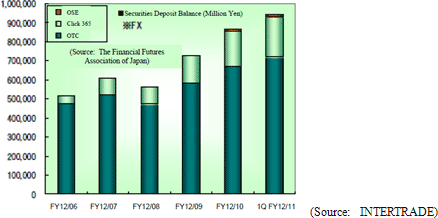 New Businesses
The consolidated subsidiary INTERTRADE Asset Management Co., Ltd. was restructured (Effective October 2011) to create a unique strategy that includes consulting services for asset management, and a newly established service of "new business development division" for the cultivation of businesses outside of the realm of the finance industry (Currently several initiatives are being researched). Intergroup sales consisted mostly of them of INTERTRADE Asset Management, with sales outside of the INTERTRADE Group during fiscal year September 2011 only amounting to about ¥1 million. However along with the major restructuring implemented in October 2011 and the recruiting of numerous personnel with bountiful experience, efforts to develop new clients and contracts to provide consulting services to institutional investors and pension funds have already been started. Therefore this subsidiary is expected to become a major contributor to earnings in the future. A new business sales target of ¥1.0 billion in fiscal year September 2014 has been established.
 (3) Image of Sales, Operating Profits Over the Next Three Years
INTERTRADE has established sales and operating profit targets for fiscal year September 2014 of ¥4.5 billion (¥3.33 billion in FY9/11) and ¥450 million (¥40 million in FY9/11), respectively. According to the Company, front office system business sales are expected to trend sideways while they endeavor to raise profit margins. At the same time market place business and new business are expected to become drivers of growth and to account for over 20% of total sales.
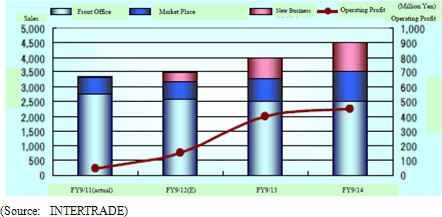 |
| Fiscal Year September 2011 Earnings Results |
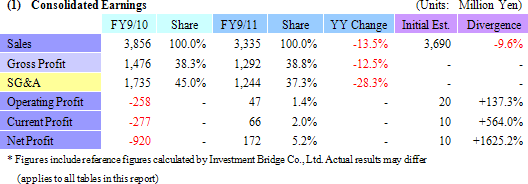 Sales Fall 13.5%, Operating Profit Turn Positive
Sales fell by 13.5% year-over-year to ¥3.335 billion. System maintenance, asset management consulting services related and sales of other repeat business fell by only 2.2% year-over-year to ¥2.641 billion despite the difficult market conditions. New implementation, system improvements, and other implementation related sales fell by 40.0% year-over-year to ¥693 million. In the repeat business, newly started research and development projects helped to absorb some of the cancellations of the "TIGER Trading System" by several clients (Securities companies) retreating from dealing operations. At the same time, implementation business sales declined due to the disappearance of work related to creating system responses to the TSE arrowhead (Launched in January 2010).With regards to profits, the sale of middle office systems and the securities company back office systems divisions (January 2011), improvements in operational efficiency (Reductions in outsourcing, labor and personnel costs), and reductions in research and development expenses (Fell to ¥25 from ¥106 million) and moving costs (Fell to ¥127 from ¥183 million) allowed operating profit to turn to a profit of ¥47 million from a loss of ¥258 million in the previous term. Furthermore increases in income from minority shareholding investments and reductions in interest bearing liabilities allowed financial expenses to decline and contributed to the improvement in non-operating income. And while contract cancellation penalties increased, reductions in headquarter moving expenses (¥84 million) and the disappearance of marketable securities valuation and liquidation losses (¥314 million) allowed extraordinary income to improve, which in turn contributed to an improvement in net profit to ¥172 million from the net loss of ¥920 million recorded in the previous term. 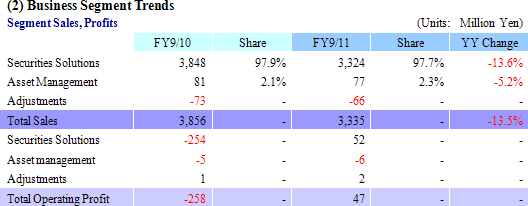 At the same time, the asset management business suffered from a decline in clients for processed information provision services due to cost reductions by various securities and asset management companies. Consequently securities consulting sales fell shy of the previous year' s levels.  (3) Financial Position, Cash Flow
Total asset at the end of the term fell by ¥1.190 billion from the end of the previous term to ¥3.578 billion. Progress in recovering receivables and long term debt extended to affiliated companies, and reductions in interest bearing liabilities were major factors influencing this decline in assets. In addition, amortization of goodwill and deposits and security deposits arising from the move of the headquarters also declined. With regards to cash flow, increases in working capital (Progress in recovering receivables for work relating to the creation of responses to the TSE arrowhead carried over from FY9/10) led to a decline in operating cash flow. At the same time reductions in sale of marketable securities contributed to a decline in investing cash flow. Free cash flow remained positive at ¥858 million. Aggressive reductions in interest bearing liabilities led to a net outflow in financing activities, and cash and equivalents declined by ¥184 million from the previous term end to ¥2.128 billion at the end of the current term.
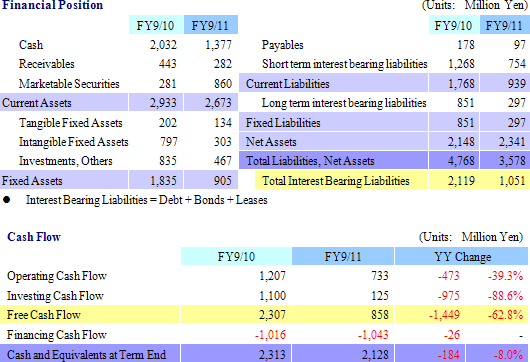 |
| Fiscal Year September 2012 Earnings Estimates |
 Higher Sales, Reduced Goodwill Amortization Allow Operating Profit to Expand to ¥150 from ¥47 Million
During fiscal year September 2012, INTERTRADE will adopt the corporate motto of "Taking on the Challenge of New Value Creation" and is endeavoring to achieve "higher sales and profits," "creation of multiple new businesses," and "expansion of new orders." Therefore sales are expected to grow by 4.3% year-over-year to ¥3.480 billion. Given that front office system business accounts for over 80% of sales currently, uncertainties in the financial markets suggest that the difficult operating environment for INTERTRADE may continue. However during the second half of the coming term, endeavors to grow the asset management business segment, including its new business and market place business, are expected to begin to bear fruit. At the same time operating profit is expected to rise by over 3.1 times to ¥150 million. And while anticipatory investments (¥120 million) are expected to arise for the cultivation of new businesses, amortization of goodwill is expected to fall in half to ¥234 million from ¥469 million.Furthermore, new orders, which are a leading indicator for future earnings (In the securities solutions business, many of the projects booked as orders take over six months before they booked as sales), are expected to rise by 10.1% year-over-year to ¥3.250 billion (Compared with ¥2.951 billion in the previous term). Dividend payment is expected to be restored for the first time since fiscal year September 2008 with a yearend payment of ¥300 per share anticipated. Moreover, INTERTRADE places a high priority upon the management benchmark of EBITDA added to anticipatory investments (Cash income excluding the influence of historical and future investments), and they anticipate this figure to be remain around the same levels as the previous term of ¥600 million in fiscal year September 2012, enabling the Company to make "investments in new businesses" and "grow operating profits by 3 fold." 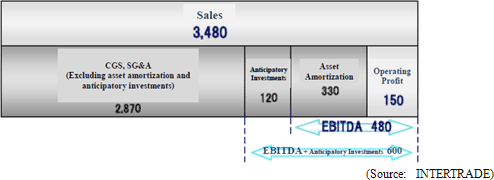
* EBITDA = Operating Profit + Asset Amortization (Goodwill Amortization + Depreciation + Software Amortization)
(2) New Business Establishment
As defined by the Midterm Business Plan, the ability to grow new businesses and expand the client base is one of the major midterm issues. As part of the plan, INTERTRADE Asset Management will expand its sales to parties outside of the INTERTRADE Group to ¥100 million (¥15 million in FY9/11), and INTERTRADE will secure orders for new business development related projects of over ¥10 million.
|
| Conclusions |
|
Disclaimer
This report is intended solely for information purposes, and is not intended as a solicitation to invest in the shares of this company. The information and opinions contained within this report are based on data made publicly available by the Company, and comes from sources that we judge to be reliable. However we cannot guarantee the accuracy or completeness of the data. This report is not a guarantee of the accuracy, completeness or validity of said information and or opinions, nor do we bear any responsibility for the same. All rights pertaining to this report belong to Investment Bridge Co., Ltd., which may change the contents thereof at any time without prior notice. All investment decisions are the responsibility of the individual and should be made only after proper consideration.Copyright(C) 2011 Investment Bridge Co., Ltd. All Rights Reserved. |

